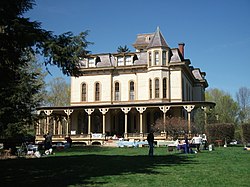Park-McCullough Historic House
|
Park–McCullough House
|
|
 |
|
| Location | North Bennington, Vermont |
|---|---|
| Coordinates | 42°55′41.89″N 73°14′49.02″W / 42.9283028°N 73.2469500°WCoordinates: 42°55′41.89″N 73°14′49.02″W / 42.9283028°N 73.2469500°W |
| Built | 1864 |
| Architect | Diaper & Dudley |
| Architectural style | Late Victorian |
| Part of | North Bennington Historic District (#80000328) |
| NRHP reference # | |
| Significant dates | |
| Added to NRHP | October 26, 1972 |
| Designated CP | August 29, 1980 |
The Park–McCullough Historic House is one of the finest and best-preserved Victorian mansions in New England. It is a thirty-five room mansion, set on 200 acres (80 hectares) of grounds, and located off Vermont Route 67A in North Bennington, Vermont, USA.
The house was built in 1864–65 by attorney and entrepreneur Trenor W. Park (1823–1882), who was born in nearby Woodford, Vermont but amassed his fortune overseeing the mining interests of John C. Fremont in California. It was designed by Henry Dudley, a prolific New York architect of the popular firm of Diaper and Dudley. The house cost $75,000 and the family moved in on Christmas Day, 1865. His descendants made extensive renovations to the house in 1889–90, largely in order to entertain President Benjamin Harrison who had come to town to dedicate the new Bennington Battle Monument.
The Park–McCullough house is an important example of an American country house in the Second Empire Style. It also incorporates architectural features of the Romantic Revival style popular at the time.
The house is now owned by a non-profit organization and is open to the public.
Trenor William Park was born outside of Bennington, Vermont in Woodford, Vermont on December 8, 1823. His family was not wealthy while he was growing up. By the age of 16, Trenor was already studying law and subsequently, was admitted to the Vermont bar at age 21. He married Vermont Governor Hiland Hall’s daughter, Laura V.S. Hall, on December 15, 1846. They had three children together: Eliza “Lizzie” Hall Park (October 17, 1848 – 1938), Laura “Lila” or “Birdie” Hall Park (1858–1939), and Trenor “Train” Luther Park (1861–1907).
...
Wikipedia


